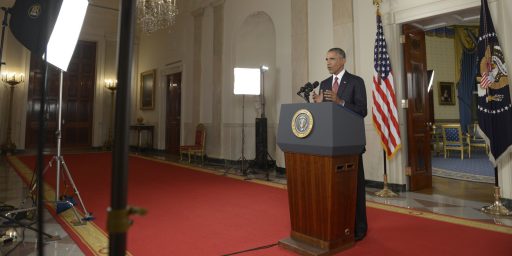Who’s Going To Pay For The President’s War Against ISIS?
As we head into a new conflict, perhaps we ought to give more thought to fiscal issues than the President is to overall strategy.
Andrew Sullivan points out that Republicans, or anyone for that matter, don’t seem to be all that concerned with how we’re going to pay for the President’s war against ISIS:
It’s been a remarkable aspect of the foreign policy “debate” over the last month that I haven’t heard a single leading Republican express misgivings about a new Iraq war’s impact on fiscal policy. And yet, for a few years now, we have been subjected to endless drama about the mounting debt when it comes to anything the government wants to do. Cost was one (ludicrous) reason to oppose Obamacare; it’s behind cutting off 3 million long-term unemployed from any benefits; it has led to proposals to turn Medicare into a premium support system and for cutting social security. Some of this fiscal vigilance I find useful – if it weren’t so transparently a way to dodge GOP responsibility for the debt and to blame Obama for all of it and if it weren’t raised as a matter of urgency when the world economy was deeply depressed (the one time when fiscal lenience is warranted). But it is hard to resist the conclusion, after the last few weeks, that it’s all a self-serving charade.
I mean: where are the fiscal conservatives now? The ISIS campaign is utterly amorphous and open-ended at this point – exactly the kind of potentially crippling government program Republicans usually want to slash. It could last more than three years (and that’s what they’re saying at then outset); the cost is estimated by some to be around $15 billion a year, but no one really knows. The last phase of the same war cost, when all was said and done, something close to $1.5 trillion – and our current travails prove that this was one government program that clearly failed to achieve its core original objectives, and vastly exceeded its original projected costs.
If this were a massive $1.5 trillion infrastructure project for the homeland, we’d be having hearing after hearing on how ineffective and crony-ridden it is; there would be government reports on its cost-benefit balance; there would be calls to end it tout court.But a massive government program that can be seen as a form of welfare dependency for the actual countries – Turkey, Iran, Jordan, Kurdistan – facing the crisis gets almost no scrutiny at all. And what scrutiny it gets is entirely due to partisanship and the desire to portray this president as effectively useless.
To be fair, the issue of paying for the President’s war isn’t necessarily one that needs to be answered immediately. We’re not talking about anything on the scale of the Iraq or Afghanistan Wars, at least not yet, and it seems apparent that the Pentagon should be able to pay for ongoing operations out of its regular operating budget for the time being. Indeed, to some extent attacks that we’ve seen launched to date have, at least in some sense already been paid for to the extent that they involve planes, bombs, and missiles, along with their related support materials, that have already been paid for. The Pentagon would be spending the same amount on this material, and on the salaries of the pilots and support personnel involved regardless of whether or not we were attacking Syria so they are essentially sunk costs that have already been paid for. The fiscal questions will come as the campaign goes on and we need to replace things like bombs and missiles with new weapons purchased from defense contractors, and if (and when?) the war itself expands and requires a greater American commitment, which seems inevitable. At least for the time being, though, the fiscal issues that Sullivan raises are not quite as immediate as the myriad of other issues that the President’s war raises.
Notwithstanding that qualification, though, Sullivan raises a valid point here. For the past two months or so since the President began air strikes against, we’ve seen a myriad of criticisms of the President’s policy from the right questioning the President’s policy. Some of these critics have argued that the President isn’t doing enough, some have argued that he’s doing too much or that certain elements of the policy, such as arming the “moderate” Syrian rebels, can’t possibly work. Other Republicans, and most especially the House and Senate Leadership, have been largely supportive of the President’s policy and worked together with Democrats to push forward last week’s vote on authorizing to fund the “moderate” Syrian rebels.
Nowhere in any of this discussion, though, has there been any talk about the fiscal issues related to the strategy that the President wants to pursue against ISIS.While the plan currently limits American involvement to airstrikes, we’ve already seen comments from the Chairman of the Joint Chiefs and the Army Chief of Staff that ground forces might be necessary at some point. The President’s own advisers have already said that the campaign against ISIS could take years even if we don’t suffer any setbacks. At the very least, this suggests that, likely sooner rather than later, we’re going to have to deal with the question of how to pay for this war, a question that becomes even more important in an era where there seems to be very little room or political consensus on budget issues. At least to some extent, we would expect to see some of these questions answered when the President submits his Fiscal Year 2016 budget next year, or when Congress deals with the 2015 budget, which was basically delayed until December thanks to a continuing resolution. However, it’s likely that the Pentagon may need some form of stop-gap authorization for additional funds before that budget is approved. At that point, choices will need to be made about where to get the money from, or whether to allow the additional spending to just be financed by debt.
The last time we went to war, there was almost no discussion in Congress about how we were going to pay for it. Indeed, the issue seems to have not occurred to anyone in the White House or Congress. Rather than raising taxes as we have in past wars, we cut taxes and did nothing to cut spending in any other part of the budget, which went a long way toward raising the budget deficit well after President Bush left office. As we sit here today, it doesn’t seem as though the campaign against ISIS is going to reach the level of the Iraq War or the Afghanistan War, although it remains within the realm of possibility that future escalations could turn it into something like those wars. Before we reach that point, and given the fact that budget debates on Capitol Hill have been extraordinarily contentious in recent years, we ought to have at least some idea of how we’re going to pay for that conflict, because the way we did it last time was pretty much the worst way possible.







The President’s war? Nobody has been yelling at him to go bomb something for months (or years)?
Well done.
My only quibble is that the Conservative approach is to think about, and plan for, eventualities now…not once they become fact.
Republicans oppose all forms of government spending, except war spending, so I have no doubt that they”ll open up the credit card for any war related spending the President proposes. Of course, it would be more fiscally prudent for them to raise taxes to pay for their war-hey, stop laughing.
Actually, running up the deficit to pay for this war makes good sense, from a Keynesian POV: most economists think we need more fiscal stimulus to really get the economy moving. Unfortunately, war spending is the only kind of fiscal stimulus the Republicans are amenable to. It would be great to spend the money on roads, bridges, schools, and health care for the poor and working class-but sociopathic Republicans would rather spend it on war, so let’s start tooling up those bomb factories. …
@stonetools:
I’ve never seen anything on the efficacy of military spending as stimulus, have you?
Spending and deficits only matter to Republicans when the recipients of spending are poor, black or Hispanic. GOP obsession with deficits waxes and wanes like the moon.
@C. Clavin:
http://fas.org/sgp/crs/natsec/RL31176.pdf
Who’s going to pay? This is not a difficult question.
The American taxpayer. The only question is whether it’s paid from current revenue or financed by way of federal debt obligations (you know, those same securities that Republicans were threatening to default on if the President didn’t accede to their demands to defund or repeal ACA.)
President’s war?
GOP: The president is weak, he dithers, why won’t he fight ISIS?
Obama: I am supporting out involvement to arm forces opposed to ISIS, and am trying to get coalition support for this.
GOP: We never wanted this, it’s your war.
Obama: Whatever.
Um, the president’s war?
@michael reynolds:
Absolutely correct. I hear that while complaining about deficits the GOP wants to gear up the printing presses to pay for bombing Mexico and Haiti to drive up white American workers wages and bombing Africa to solve the Ebola outbreak. Surprisingly, I have it on good authority the GOP wants to bomb Canada as payback for the hockey gold medal they stole and to bomb the sheep in Greenland…..just for sport.
The Chinese, like usual.
The problem is, is that the way [the president] has done it over the last eight years is to take out a credit card from the Bank of China in the name of our children, driving up our national debt from $5 trillion for the first 42 presidents – #43 added $4 trillion by his lonesome, so that we now have over $9 trillion of debt that we are going to have to pay back — $30,000 for every man, woman and child. That’s irresponsible. It’s unpatriotic. – Obama, 2008
Of course, that was before he got his hands on said credit card and pushed us past the $17T mark.
@C. Clavin:
I have. It’s potentially stimulative (see, e.g., WWII) but not as stimulative as peacetime spending.
Or, in other words, a tank is just a tank, and most of the time just…sits there, and doesn’t contribute to other economic activity. A bridge, on the other hand, transports goods and services and does so constantly for decades and decades.
@James: @Rafer Janders:
That wascally wabbit voting “present” again?
@Jack:
You do realize that most of the $17T you speak of is due to policies and events that happened on Bushs watch and littele or nothing to do with Obama, right? Like unfunded wars, unfunded tax cuts, a crashed economy, etc.?
Here’s the make-up of the deficit through 2019.
http://3.bp.blogspot.com/-2S1KPaSqGjY/ThQNmwXFb6I/AAAAAAAADYY/Y2qWk66EH64/s1600/5-10-11bud-f1.jpg
Of course you don’t. You don’t live in the fact-based world.
@Rafer Janders:
Yeah according to the link I provided from the CBO only WW2 and Korea have been particularly stimulative…the rest are just, meh.
Sinking some serious money into infrastructure would be good.
Tanks and missiles are a necessary evil in the real world, not the highest and best use of resources.
The last balanced budget (not engineered one through accounting or a dot com bubble) was run in the Kennedy administration. 1961 or 1962 if memory serves. Stop with the infantile it’s all Bushs fault, eh?
@C. Clavin: Yeah, but of course all of little Bush’s 4T belongs to Bush. Double standard much?
Wow. Both Andrew Sullivan and Doug just noticed that Republicans who scream about deficits don’t really care about deficits.
But that’s okay. I’m sure that whenever Rand Paul or Ted Cruz explains that we have to make life for poor people in order to balance the budget, both of them will once again explain how only Republicans are serious about fiscal matters.
@Jack:
He was handed a surplus…so if Bush didn’t spend that money…who created his deficits?
I’m waiting?
@wr:
Here’s a good piece on Republican fiscal realities:
http://nymag.com/daily/intelligencer/2014/09/paul-ryan-declares-war-against-math.html
@C. Clavin: There was no surplus! It was a projected surplus that never materialized. If you are going to lie, you need to try harder.
You guys are much too serious today, with all that talk about genetalia and war an sech.
How bout some good time rock and roll
http://m.youtube.com/watch?v=Ae829mFAGGE
@Jack:
@Guarneri:
It never materialized because Bush spent it.
@C. Clavin: By definition, every spending when there is serious economic slack and the interest is stuck at the zero bound is stimulative. However, military spending does have a very low multiplier.
@Guarneri:
Man, it really sticks in conservatives’ craw that Clinton balanced the budget-something neither Nixon, GHWB or Saint Ronaldus (PBUM) did- and that GWB pissed away Clinton’s surplus. It’s almost as if Republicans aren’t good fiscal stewards, despite their big talk.
@humanoid.panda:
Ha…agreed…anything is better than nothing.
@Jack: It’s almost as though the peak of the business cycle requires a different set of fiscal policies than during the recovery from the worst financial crisis in eighty years!
Also, please be so kind as to point out which policies Obama passed that contribute to higher deficits.
43 had the Iraq war, Medicare Part D, and the tax cuts.
Obama had the stimulus (phased out and not structured), and passed the ACA and eliminated some of the tax cuts, policies that actuall cut the long term deficit.
Everything else is the business cycle..
@Guarneri: I think you are thinking about the 1964 budget passed by LBJ to make Harry Byrd happy so that he will leave time on the Congressional calendar for civil rights legislation. That budget was passed on the basis of a gimic: LBJ basically fired a bunch of postal workers under the implicit understanding they will be rehired next year..
No, Neanderthal, it’s just an adult understanding of how spending programs have grown since 1962 and their origin and use. Further, revenues from a stock bubble can render taxes. From a real estate bubble, not so much.
Your punishment is to be forced to watch this Clockwork Orange style.
http://m.youtube.com/watch?v=LRPILZS1hc8
@C. Clavin: I’m sorry, and here I thought that Congress had the power of the purse and control of all spending bills. Remind me again, who controlled congress during most of the Bush presidency?
Presidents don’t write legislation, nor get to vote on it, but you keep on showing us how ignorant you are.
You use 2001 to 2011…so you just get to ignore everything that happened in Obama’s first 3 years? Hypocrite much?
@Jack:
So you are saying the Iraq war and the Bush tax cuts are Democratic policies?
You do realize that 2009-2011 are those years, right?
Here’s what I quoted on that…
Read much?
@Guarneri:
So the liberal posters post statistics and links to papers, and you respond with insults, YouTube videos, and gibberish. Ok, you are maintaining your 100 per cent troll posting status.
@Jack:
For the most part, Republicans.They had the House 2000-2006 and the Senate 2002-2006.
@Guarneri: “Further, revenues from a stock bubble can render taxes. From a real estate bubble, not so much.
Except this real estate bubble was actually a stock bubble, in the sense that the real money on it was not made by real estate developers or house flippers, but financial engineers. The profits generated plenty of taxable income and capital gains.
@Guarneri:
A real estate bubble results in increased property tax revenues as homes turnover.
It’s not hard to see: a home that someone sells might be on the tax roll at an assessed value of $250,000, and when sold be on the tax roll at $500,000 – property taxes to local jurisdictions increase. Also, during the housing bubble, many people were taking money out of the increased value of their homes to purchase vehicles, buy second homes, and so forth, a lot of tax revenue emanated from the housing bubble.
@Jack:
The Chinese have a dollar factory somewhere, do they?
How are we going to pay for it? Simple: Raise taxes on the rich! It seems to be the constant answer to any revenue problems, so it won’t hurt to trot that one out again.
@stonetools:
So by that thinking, shouldn’t the Republican Congress be responsible for Obama’s debt and spending since they’ve been in charge for most of his time in office? Blaming Congress during Bush’s administration and then turning around and blaming the Obama during his seems to be trying to have it both ways. I think Jack should pick one or the other.
@beth:
Logical consistency is not a strength for Obama haters. Remember, he’s both history’s greatest tyrant and weak and indecisive.
@Moderate Mom:
Well…seeing that tax cuts on the rich contributed mightily to current revenue problems…isn’t increasing those taxes a logical response to the revenue problems that the tax cuts caused?
@Moderate Mom:
Well, it is simple, and it would work. And it’s only “the constant answer” because we never actually do it.
Remember: the rich are the ones with the money. The richest 85 people in the world, combined, have as much wealth as the poorest 3,000,000,000 (yes, that’s 3 billion with a “b”) people in the world, combined.
The Chinese own about 8% of our debt. Saying we borrow all our money from the chinese is saying you’re economically illiterate (and therefore almost certainly republican).
@Moderate Mom:
The propensity of folks on the right to grovel before wealth never ceases to amaze me.
@steve q: True. People say Bush fought Iraq on a Chinese credit card. Untrue. They borrowed the money from Social Security. And they have no intention of paying it back.
@Moderate Mom:
Back during the time of that Communist Dwight Eisenhower, when we frequently balanced the budget, marginal tax rates on the rich were as high as 90 per cent. Was that a time of economic stagnation and despair? Nope.
Now, today is a much different, more competitive world. But there is no evidence at all that high taxes on the rich necessarily hurts the economy or isn’t an effective way to help balance the budget.
Boy, this therad sure brought out the solid Republican arguments, eh?
BTW, in answer to the headline: Not me (hums O Canada).
@stonetools:
Republucans swore the Bush41 and Clinton tax increases would destroy the economy and the Bush 43 tax cuts would rescue the economy. They were wrong on all counts.
Kansas and NJ and Minnesota and Wisconsin all show, on the so-called laboratory level, that tax cuts do not lead to growth.
Yet still they insist….
Simple! President Brownback will lower taxes. Works every time!
Long war can be easily paid for by closing down of safety net programs, close all public schools, and close the post office. Then raise taxes on what’s left of the middle class and raise taxes on the poor. Then last but the most fun cut corp. taxes to just 2% and taxes for the job creating rich to 1%. No taxes on the dod vendors helping Amerika fight the fake wars around the earth.
The IMPAC card.
@Moderate Mom:
While I realize that is a snarky comment… I believe we know who will actually pay for the wars: The poor.
Assuming the following:
– that tax revenues continue unchanged, and
– the US does not to levy a V.A.T. to account for the military spending of the last 11 years of war, then…
Cuts to current programs will need to take place.
As there are enough republicans in Congress to continue building bridges to nowhere, then the social programs will need to get cut.
As we have seen during the overwhelming success of the trickle down theory, costs of social programs will be shifted to the states, which will need to find new revenue to pay for the costs.
More casinos, anyone? I hear it’s worked wonders in Atlantic City.
anyone who still actually pays taxes? just a guess there.
@C. Clavin: It’s been a long time, but in an econ class that I took years ago, the professor (a leftist who used to post on Marxistlist) indicated that all “big G” was equally stimulatory and that borrowed money was slightly more stimulatory than money acquired from taxation–raising taxes to spend more yields less stimulation.
http://youtu.be/wpW_KMHlAmo
@Just ‘nutha’ ig’rant cracker:
Sure…sketchy analogy…but if I spend money from my credit card (borrowed money) and I also have cash on hand (un-taxed wealth) then my personal economy is bigger…at least until I have to pay the credit charges.
Then it becomes a discussion about borrowing versus revenue. I tend to be fiscally conservative (I don’t carry credit card balances, all my vehicles are paid for, my only debt is my house and I have far more assets than that relatively small liability) so I would prefer to increase revenue…especially when our deficits are in large part driven by historically low tax rates. Your mileage may vary. Keep in mind that I am in the top 5% of income…so I’m arguing against self-interest.
@Rafer Janders: The problem with that is not enough equipment is destroyed like it was in WWII so the manufacturing sector is not as stimulated in today’s conflicts like it was them. Those were the days of a 1M+ ARMY. Now we have a 1M+ MILITARY. Most of the spending goes to Military support contracts so the money earned from those contracts will stagnate around military towns and in defense contractor circles (i.e. D.C)
@James: (shrug)
OTOH, where is the anti-war left on this one? Nowhere, so far.
Odd, given how vocal they were with Bush.
Another point that’s changed… we aren’t seeing body counts. No civilian death counts, no number of our service people dead/injured, no constant harraging about women and whildren who died at the hands of the Resident…. none of it.
@Eric Florack:
Whoa… whoa… whom there…
Kinda comparing apples to uranium 238.
1) There is not much of an anti-war left (save the usual nuns & such that are ALWAYS anti-war) because THEY BEHEADED PEOPLE LIVE AND BROADCASTED IT.
2) As to Bush, The Left & The Right & The Middle were all united post-911. It’s when Bush & Co decided that Iraq was a better target than Afghanistan (hold-out of Al-Qaeda) that the left said WTF.
Eric, you may be a bit mistaken that the Left is not Patriotic.
Likely, the Left is more so than the right (as evidenced by the ACLU fighting of constitutional causes, often in direct opposition of what we would consider “the Right”).
The same support that the country showed in the first few weeks post 9-11 is the same unity and focus that we have now.
It’s to our benefit that we have a President that has decided to make it a global US vs. a radical isolated THEM.
Since the current “coalition of the willing” (to coin a phrase from the past) includes traditional western and Arabic countries, the actions are seen as just and supported by most.
You may very well be surprised: It’s called good governance.
@Eric Florack:
Funny that, they should come on TV every night on the news hour and list the 0 US military dead in the ongoing campaign in Iraq and Syria. I’m sure you would have no problem with that body count being harped on daily by the media.
@Liberal Capitalist:
support the war effort, buy weed